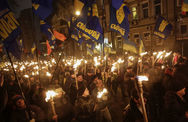 In my third and final blog post on Jewish life in Ukraine past and present, based an article that appeared recently in the Jerusalem Post, the focus turns to Ukraine’s current wave of nationalism and its impact on the Jewish community. The presence and place of Jews in the still-crystallising Ukrainian state remains a sensitive issue, but this is not primarily because of a physical threat to Jewish well-being. Jewish communal buildings in Kiev require considerably less physical security around them than do their equivalents in Western Europe. Nationalist groups, nevertheless, played a very visible role during the Maidan protests. The author witnessed the proliferation of banners of the far-right Svoboda Party on the square in December 2013 alongside the red and black flags invoking the memory of Stepan Bandera’s UPA (Ukrainian Insurgent Army). The armed volunteer groups, which bore the brunt of the fighting in the summer of 2014 when the Ukrainian army faltered, flew similar colours. But the nationalist candidate in the presidential elections of 2014, one Dmitro Yaros, scored just 0.7% of the vote. Svoboda also achieved a tiny showing in presidential elections. Efforts by the volunteer battalions to transform themselves into political parties have as yet achieved meagre results. “Ukrainians don’t want to be led by extremists,” a young man in Kiev told me. Still, while nationalist political achievements remain marginal and levels of antisemitic violence low, the debate over national memory and its symbols continues to raise difficult questions for Ukraine’s Jews. Eduard Dolinsky, executive director of the Kiev-based Ukrainian Jewish Committee says the apparent electoral weakness of the nationalists is deceptive. Dolinsky pointed to their strength at the municipal level. He is concerned at the role of what he called “apologists of national memory” – propagandist pseudo-historians who seek to downplay the role of Ukrainian nationalist movements in the Holocaust and the persecution of Jews in Ukraine. Dolinsky says of such figures as Bandera and Roman Shukhevych: “They participated in the Holocaust. Then people present them as protectors of Jews. This is Holocaust denial and desecration of Jewish memory.” The placing of these figures in a mainstream pantheon of national heroes in Ukraine is evident. In July 2016, a major street in Kiev was named for Bandera. On May 25, 2016, the Ukrainian parliament held a minute of silence for Petlyura. Other voices, both Jewish and non-Jewish, dispute the gravity and implications of the “mainstreaming” of wartime nationalist leaders. Josef Zissels, chairman of the Vaad organisation of Ukrainian Jews, was quoted recently warning against “unnecessary assignment of blame” in a country where Jews enjoy formal equal rights and levels of antisemitic violence are low. The country faces enormous challenges ahead in the building of institutions, fighting systemic corruption and forging a version of national identity with which all elements of society can at least broadly identify. The Jews, both the actual living examples of them in Ukraine and no doubt also the mythical, archetypal Jew that never seems to quite vanish from the European consciousness, will be playing a role in this. For the full article, see/http://www.jpost.com/Jerusalem-Report/In-the-land-of-the-trident-503106 w ww.jpost.com/Jerusalem-Report/In-the-land-of-the-trident-503106
0 Comments
Leave a Reply. |
Keeping stories aliveThis blog aims to discuss historical events relating to the Jewish communities of Ukraine, and of Eastern Europe more widely. As a storyteller, I hope to keep alive stories of the past and remember those who told or experienced them. Like so many others, I am deeply troubled by the war in Ukraine and for the foreseeable future, most articles published here will focus on the war, with an emphasis on parallels with other tumultuous periods in Ukraine's tragic history. Archives
March 2024
Categories
All
|
 RSS Feed
RSS Feed
